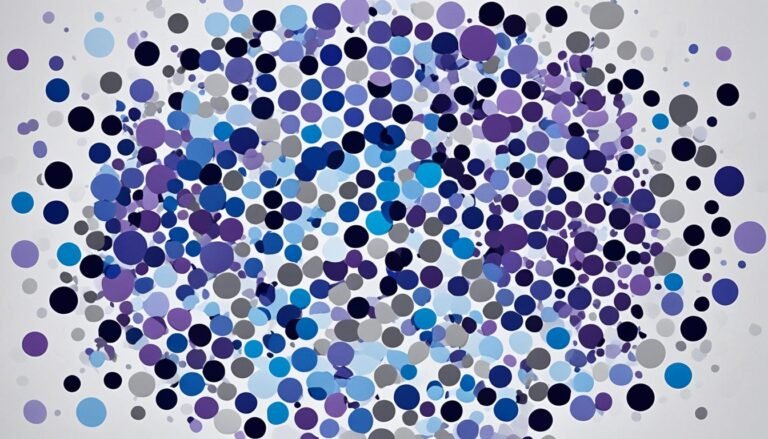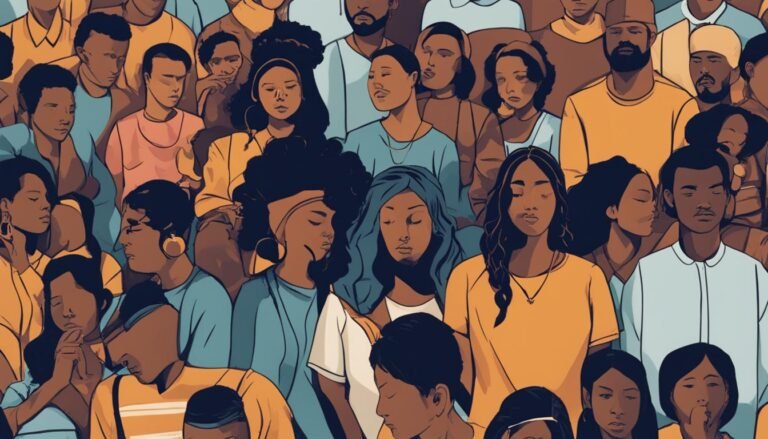What is the black-white paradox in health?
The black-white paradox in health refers to the puzzling twist in racial health disparities that defies typical socioeconomic explanations. Despite facing higher levels of socioeconomic disadvantage, discrimination, and worse physical health outcomes, black Americans tend to experience similar or lower rates of psychiatric disorders compared to white Americans. This paradox has been observed in various studies and has prompted further research to understand the underlying mechanisms and factors contributing to this phenomenon.
Key Takeaways:
- The black-white paradox in health refers to the puzzling twist in racial health disparities.
- Black Americans tend to experience similar or lower rates of psychiatric disorders compared to white Americans despite facing higher levels of socioeconomic disadvantage and discrimination.
- The factors contributing to this paradox are still being explored.
- Understanding and addressing the underlying factors can help work towards achieving racial health equity.
Understanding the Racial Health Disparities
Racial health disparities are significant differences in health outcomes, healthcare access, and quality that exist between different racial and ethnic groups. The prevalence of these disparities is well-documented, with black Americans experiencing higher rates of chronic diseases, shorter life expectancy, and increased mortality compared to their white counterparts. These disparities are influenced by a complex interplay of factors, including socioeconomic status, discrimination, access to healthcare, cultural beliefs and practices, and social determinants of health.
Socioeconomic status plays a crucial role in racial health disparities. Black individuals are more likely to face socioeconomic disadvantages, such as poverty, limited educational opportunities, and inadequate housing, which can adversely impact their health outcomes. Additionally, discrimination in various forms, including systemic racism, unconscious bias, and health disparities within the healthcare system, contributes to the unequal distribution of healthcare resources and services.
Access to healthcare plays a vital role in determining health outcomes within racial and ethnic groups. Black Americans often face barriers to healthcare access, such as lack of health insurance, limited availability of healthcare providers in their communities, and implicit bias in healthcare settings. These barriers can result in delayed or inadequate healthcare, leading to poorer health outcomes and increased mortality rates.
Cultural beliefs and practices also influence racial health disparities. Black Americans may face cultural barriers that hinder their engagement with healthcare systems, such as mistrust due to historic medical injustices and a preference for alternative healing practices. These factors can further exacerbate existing health disparities and hinder efforts to address racial health inequality.
Social determinants of health, which include factors such as income inequality, residential segregation, and access to healthy food and safe neighborhoods, significantly contribute to racial health disparities. Black Americans are disproportionately affected by these social determinants, which negatively impact their physical and mental well-being.
Despite significant progress in medical care and public health efforts, racial health disparities persist, highlighting the need for targeted interventions and policies to address healthcare inequality and achieve health equity among all racial and ethnic groups.
To gain a better understanding of the racial health disparities, let’s take a look at an illustrative table:
| Racial/Ethnic Group | Life Expectancy | Prevalence of Chronic Diseases | Mortality Rates |
|---|---|---|---|
| Black Americans | 72 years | Higher rates of hypertension, diabetes, and obesity | Higher overall mortality rates |
| White Americans | 78 years | Lower rates of chronic diseases | Lower overall mortality rates |
The table above highlights the disparities in life expectancy, chronic disease prevalence, and mortality rates between black and white Americans. These statistics shed light on the stark contrast in health outcomes, emphasizing the urgent need to address racial health disparities and strive towards healthcare equity.
By acknowledging and addressing the underlying factors contributing to racial health disparities, such as socioeconomic status, discrimination, access to healthcare, cultural beliefs, and social determinants of health, we can work towards closing the gap and ensuring equitable health outcomes for all individuals, regardless of their race or ethnicity.
The Black-White Paradox in Mental Health
The black-white paradox extends to mental health, where black Americans have lower or similar rates of mental disorders compared to white Americans. Despite facing higher levels of stress, discrimination, and socioeconomic disadvantage, black individuals exhibit higher levels of mental resilience and mental well-being. This resilience is observed across various psychiatric disorders, including major depressive disorder, anxiety disorders, and substance use disorders.
Although the reasons behind this paradox are still being investigated, it is believed that psychosocial factors and cultural strengths play a significant role in fostering resilience among black individuals. The presence of protective psychosocial resources, such as strong social support networks, religiosity, and cultural practices, may help buffer the negative effects of stress and discrimination on mental health.
Furthermore, black communities often demonstrate a sense of collective identity and a shared history of resilience in the face of adversity, which contributes to their mental well-being. These cultural strengths and community support systems can provide a sense of belonging, foster hope, and promote coping mechanisms, enhancing mental resilience and reducing the risk of mental disorders.
Exemptions to the Paradox
While the black-white paradox generally holds true, there are exceptions to this pattern. It is important to acknowledge that black women experience higher rates of posttraumatic stress disorder (PTSD) compared to white women. This finding suggests that the interaction between gender and race can influence mental health outcomes in complex ways.
| Mental Disorders | Prevalence in Black Americans | Prevalence in White Americans |
|---|---|---|
| Major Depressive Disorder | Lower or similar rates | Higher rates |
| Anxiety Disorders | Lower or similar rates | Higher rates |
| Substance Use Disorders | Similar or lower rates | Higher rates |
| Posttraumatic Stress Disorder | Higher rates in black women | Lower rates in white women |
“Resilience is the process of adapting well in the face of adversity, trauma, tragedy, threats, or significant sources of stress, such as family and relationship problems, serious health problems, or workplace and financial stressors. It means ‘bouncing back’ from difficult experiences” – American Psychological Association
Understanding and harnessing the resilience exhibited by black individuals can provide valuable insights for mental health interventions and support systems. By identifying the protective factors within the black community and promoting culturally sensitive and inclusive mental healthcare, we can empower individuals to overcome adversities and achieve optimal mental well-being.
Factors contributing to the black-white paradox
Several factors have been proposed to explain the black-white paradox in health. One potential explanation is the presence of psychosocial resources, including social support, religiosity, and cultural factors, which may contribute to better mental health outcomes among black individuals.
Social support plays a crucial role in promoting mental well-being. Studies have shown that strong social connections and supportive relationships can serve as buffers against the negative impact of stress and discrimination on mental health. Black individuals often have robust social networks and close-knit communities, providing them with a sense of belonging and emotional support.
Religiosity is another psychosocial resource that has been associated with better mental health outcomes. The importance of faith and religious practices in the black community has been well-documented. Engaging in religious activities and having a strong spiritual foundation can foster hope, resilience, and coping strategies, which contribute to improved mental well-being.
“Psychosocial resources such as social support and religiosity contribute to better mental health outcomes among black individuals.”
Cultural factors, such as a strong racial identity and values, can also play a protective role in mental health. Embracing one’s cultural heritage and maintaining a positive sense of identity can provide a source of strength and resilience in the face of adversity and discrimination.
In addition to psychosocial resources, health behaviors also contribute to the black-white paradox in health. Adopting healthier lifestyle choices, including regular exercise and a balanced diet, can have a positive impact on mental well-being. Engaging in physical activity releases endorphins, which are natural mood boosters, while a nutritious diet provides essential nutrients that support brain function.
Perceived discrimination is a common experience for many black individuals and has been found to partially explain the mental health advantage observed in this population. The resilience developed in response to discrimination may contribute to better mental health outcomes. However, it is essential to recognize that discrimination has detrimental effects on overall well-being and can lead to chronic stress, psychological distress, and other negative health outcomes.
To summarize, psychosocial resources, health behaviors, and perceived discrimination all play a role in the black-white paradox in health. These factors collectively contribute to the mental health advantage observed among black individuals, counteracting the negative impact of socioeconomic disadvantage and discrimination. By understanding and addressing these factors, we can work towards reducing racial health disparities and promoting better mental health for all.

Addressing the Black-White Paradox
To address the black-white paradox in health, healthcare interventions and policies need to prioritize reducing socioeconomic disparities, improving access to quality healthcare, and addressing the social determinants of health that contribute to these disparities.
One crucial intervention is the provision of affordable and accessible mental health services. Mental health plays a significant role in overall well-being, and ensuring that black individuals have access to culturally sensitive and appropriate care is essential for addressing the paradox.
“Access to mental health services is vital for addressing the black-white paradox and promoting equitable health outcomes.”
Additionally, healthcare policies should focus on implementing measures that reduce discrimination and promote equality. Discrimination, experienced by many black individuals, has detrimental effects on mental health and contributes to the paradox. Policies that address discrimination and promote inclusivity can help mitigate its impact.
Efforts should also be made to address systemic and structural factors that perpetuate racial health disparities. This includes promoting policies that prioritize early childhood education, equal employment opportunities, affordable housing, and eliminating food deserts in predominantly black communities.
By focusing on interventions, healthcare policies, and addressing social determinants of health, we can work towards reducing disparities and achieving equitable health outcomes for all.
Examples of Interventions and Policies to Address the Black-White Paradox
| Intervention/Policy | Description |
|---|---|
| Expanding Medicaid | Increasing access to healthcare for low-income individuals, including many black Americans, who may otherwise lack coverage. |
| Culturally Sensitive Care Training | Providing healthcare professionals with education and training to ensure culturally sensitive and appropriate care for diverse populations. |
| Addressing Housing Inequality | Implementing policies to address housing disparities and ensure affordable and safe housing options for all individuals. |
| Education Equity | Investing in high-quality education in predominantly black communities to address educational disparities and improve long-term health outcomes. |
Implications for Research and Policy
The black-white paradox in health reveals significant research gaps that necessitate further investigation into the underlying mechanisms and factors contributing to this phenomenon. Understanding these complexities will help inform policies aimed at addressing the racial health disparities and achieving racial health equity.
Research Gaps
Exploring the role of psychosocial resources, such as social support, religiosity, and cultural factors, is crucial in unraveling the black-white paradox in health. Research should examine how these resources contribute to better mental health outcomes among black individuals, despite facing higher levels of stress and discrimination. Additionally, investigating the impact of health behaviors, like exercise and healthy diet, on mental well-being can provide insights into the protective factors that mitigate the effects of socioeconomic disadvantage.
“Research must delve into the nuanced experiences of black individuals and identify the unique factors that shape their mental resilience and well-being.”
Furthermore, studying the influence of discrimination on mental health outcomes is paramount. Understanding how perceived discrimination affects mental health among black populations can unveil strategies to mitigate its negative effects and promote better mental well-being.
Policy Implications
Addressing the black-white paradox in health necessitates comprehensive policy interventions that go beyond healthcare access and delivery. Policymakers must aim to tackle the root causes of racial health disparities by addressing the social determinants of health, such as education, housing, and employment. By implementing policies that promote racial health equity, governments and organizations can work towards eliminating the disparities and improving overall health outcomes.
Key policy implications include:
- Strengthening anti-discrimination laws and enforcing them to reduce prejudice and discrimination in healthcare settings
- Increasing funding for mental health services in underserved communities to ensure equitable access to care
- Implementing culturally sensitive care models that account for the unique experiences and needs of diverse populations
- Incorporating mental health education and awareness programs in schools and communities to reduce stigma and promote early intervention
- Investing in programs that target the social determinants of health, such as affordable housing, quality education, and employment opportunities
By prioritizing these policy implications, societies can strive towards achieving racial health equity and ensure that all individuals have equal opportunities to attain optimal physical and mental well-being.

Conclusion
The black-white paradox in health is a complex and multifaceted issue that challenges our understanding of racial health disparities. Despite facing higher levels of socioeconomic disadvantage and discrimination, black Americans exhibit higher levels of resilience and mental well-being compared to their white counterparts. This paradox calls for a closer examination of the underlying factors that contribute to these disparities.
Addressing the racial health disparities requires a comprehensive and equitable approach that considers the social determinants of health. It is crucial to explore the role of psychosocial resources, such as social support and cultural factors, in promoting better mental health outcomes among black individuals. Additionally, interventions and healthcare policies should focus on reducing socioeconomic disparities, improving access to quality healthcare, and tackling the systemic factors that perpetuate racial health disparities.
By understanding and addressing the underlying factors, we can strive towards achieving racial health equity for all individuals. The black-white paradox in health serves as a call to action for further research and policy implementation to close the gap in health outcomes and ensure equal access to healthcare for all racial and ethnic groups. Together, we can work towards a more equitable and inclusive healthcare system that addresses the needs of every individual.
FAQ
What is the black-white paradox in health?
The black-white paradox in health refers to the puzzling twist in racial health disparities that defies typical socioeconomic explanations. Despite facing higher levels of socioeconomic disadvantage, discrimination, and worse physical health outcomes, black Americans tend to experience similar or lower rates of psychiatric disorders compared to white Americans.
What are racial health disparities?
Racial health disparities refer to the differences in health outcomes and healthcare access and quality between different racial and ethnic groups. These disparities are influenced by various factors, including socioeconomic status, discrimination, access to healthcare, cultural beliefs and practices, and social determinants of health.
Do black Americans have lower rates of mental disorders?
Yes, the black-white paradox extends to mental health, where black Americans have lower or similar rates of mental disorders compared to white Americans. Despite facing higher levels of stress, discrimination, and socioeconomic disadvantage, black individuals exhibit higher levels of mental resilience and mental well-being.
What factors contribute to the black-white paradox in health?
Several factors have been proposed to explain the black-white paradox in health. These include the presence of psychosocial resources, such as social support, religiosity, and cultural factors, as well as health behaviors like exercise and healthy diet. Perceived discrimination has also been found to partially explain the mental health advantage observed in black individuals.
How can we address the black-white paradox in health?
To address the black-white paradox in health, interventions and healthcare policies should focus on reducing socioeconomic disparities, improving access to quality healthcare, and addressing the social determinants of health. This includes providing affordable and accessible mental health services, promoting culturally sensitive care, and implementing policies that reduce discrimination and promote equality.
What are the implications for research and policy?
The black-white paradox in health highlights the need for further research to understand the underlying mechanisms and factors that contribute to this phenomenon. From a policy perspective, addressing the racial health disparities requires a comprehensive approach that goes beyond healthcare access and delivery to address the social determinants of health and promote racial health equity.
What is the conclusion regarding the black-white paradox in health?
The black-white paradox in health is a complex and multifaceted issue that challenges our understanding of racial health disparities. While black Americans face numerous social and economic challenges, they also exhibit higher levels of resilience and mental well-being compared to white Americans. By understanding and addressing the underlying factors, we can work towards achieving racial health equity for all individuals.






